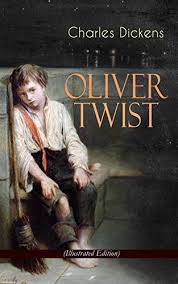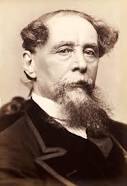Oliver Twist Page #11
Oliver Twist; or, the Parish Boy's Progress is Charles Dickens's second novel, and was published as a serial from 1837 to 1839 and released as a three-volume book in 1838, before the serialization ended. The story centres on orphan Oliver Twist, born in a workhouse and sold into apprenticeship with an undertaker.
'It's only about young Twist, my dear,' said Mr. Sowerberry. 'A very good-looking boy, that, my dear.' 'He need be, for he eats enough,' observed the lady. 'There's an expression of melancholy in his face, my dear,' resumed Mr. Sowerberry, 'which is very interesting. He would make a delightful mute, my love.' Mrs. Sowerberry looked up with an expression of considerable wonderment. Mr. Sowerberry remarked it and, without allowing time for any observation on the good lady's part, proceeded. 'I don't mean a regular mute to attend grown-up people, my dear, but only for children's practice. It would be very new to have a mute in proportion, my dear. You may depend upon it, it would have a superb effect.' Mrs. Sowerberry, who had a good deal of taste in the undertaking way, was much struck by the novelty of this idea; but, as it would have been compromising her dignity to have said so, under existing circumstances, she merely inquired, with much sharpness, why such an obvious suggestion had not presented itself to her husband's mind before? Mr. Sowerberry rightly construed this, as an acquiescence in his proposition; it was speedily determined, therefore, that Oliver should be at once initiated into the mysteries of the trade; and, with this view, that he should accompany his master on the very next occasion of his services being required. The occasion was not long in coming. Half an hour after breakfast next morning, Mr. Bumble entered the shop; and supporting his cane against the counter, drew forth his large leathern pocket-book: from which he selected a small scrap of paper, which he handed over to Sowerberry. 'Aha!' said the undertaker, glancing over it with a lively countenance; 'an order for a coffin, eh?' 'For a coffin first, and a porochial funeral afterwards,' replied Mr. Bumble, fastening the strap of the leathern pocket-book: which, like himself, was very corpulent. 'Bayton,' said the undertaker, looking from the scrap of paper to Mr. Bumble. 'I never heard the name before.' Bumble shook his head, as he replied, 'Obstinate people, Mr. Sowerberry; very obstinate. Proud, too, I'm afraid, sir.' 'Proud, eh?' exclaimed Mr. Sowerberry with a sneer. 'Come, that's too much.' 'Oh, it's sickening,' replied the beadle. 'Antimonial, Mr. Sowerberry!' 'So it is,' acquiesced the undertaker. 'We only heard of the family the night before last,' said the beadle; 'and we shouldn't have known anything about them, then, only a woman who lodges in the same house made an application to the porochial committee for them to send the porochial surgeon to see a woman as was very bad. He had gone out to dinner; but his 'prentice (which is a very clever lad) sent 'em some medicine in a blacking-bottle, offhand.' 'Ah, there's promptness,' said the undertaker. 'Promptness, indeed!' replied the beadle. 'But what's the consequence; what's the ungrateful behaviour of these rebels, sir? Why, the husband sends back word that the medicine won't suit his wife's complaint, and so she shan't take it--says she shan't take it, sir! Good, strong, wholesome medicine, as was given with great success to two Irish labourers and a coal-heaver, only a week before--sent 'em for nothing, with a blackin'-bottle in,--and he sends back word that she shan't take it, sir!' As the atrocity presented itself to Mr. Bumble's mind in full force, he struck the counter sharply with his cane, and became flushed with indignation. 'Well,' said the undertaker, 'I ne--ver--did--' 'Never did, sir!' ejaculated the beadle. 'No, nor nobody never did; but now she's dead, we've got to bury her; and that's the direction; and the sooner it's done, the better.' Thus saying, Mr. Bumble put on his cocked hat wrong side first, in a fever of parochial excitement; and flounced out of the shop. 'Why, he was so angry, Oliver, that he forgot even to ask after you!' said Mr. Sowerberry, looking after the beadle as he strode down the street. 'Yes, sir,' replied Oliver, who had carefully kept himself out of sight, during the interview; and who was shaking from head to foot at the mere recollection of the sound of Mr. Bumble's voice. He needn't haven taken the trouble to shrink from Mr. Bumble's glance, however; for that functionary, on whom the prediction of the gentleman in the white waistcoat had made a very strong impression, thought that now the undertaker had got Oliver upon trial the subject was better avoided, until such time as he should be firmly bound for seven years, and all danger of his being returned upon the hands of the parish should be thus effectually and legally overcome. 'Well,' said Mr. Sowerberry, taking up his hat, 'the sooner this job is done, the better. Noah, look after the shop. Oliver, put on your cap, and come with me.' Oliver obeyed, and followed his master on his professional mission. They walked on, for some time, through the most crowded and densely inhabited part of the town; and then, striking down a narrow street more dirty and miserable than any they had yet passed through, paused to look for the house which was the object of their search. The houses on either side were high and large, but very old, and tenanted by people of the poorest class: as their neglected appearance would have sufficiently denoted, without the concurrent testimony afforded by the squalid looks of the few men and women who, with folded arms and bodies half doubled, occasionally skulked along. A great many of the tenements had shop-fronts; but these were fast closed, and mouldering away; only the upper rooms being inhabited. Some houses which had become insecure from age and decay, were prevented from falling into the street, by huge beams of wood reared against the walls, and firmly planted in the road; but even these crazy dens seemed to have been selected as the nightly haunts of some houseless wretches, for many of the rough boards which supplied the place of door and window, were wrenched from their positions, to afford an aperture wide enough for the passage of a human body. The kennel was stagnant and filthy. The very rats, which here and there lay putrefying in its rottenness, were hideous with famine. There was neither knocker nor bell-handle at the open door where Oliver and his master stopped; so, groping his way cautiously through the dark passage, and bidding Oliver keep close to him and not be afraid the undertaker mounted to the top of the first flight of stairs. Stumbling against a door on the landing, he rapped at it with his knuckles. It was opened by a young girl of thirteen or fourteen. The undertaker at once saw enough of what the room contained, to know it was the apartment to which he had been directed. He stepped in; Oliver followed him. There was no fire in the room; but a man was crouching, mechanically, over the empty stove. An old woman, too, had drawn a low stool to the cold hearth, and was sitting beside him. There were some ragged children in another corner; and in a small recess, opposite the door, there lay upon the ground, something covered with an old blanket. Oliver shuddered as he cast his eyes toward the place, and crept involuntarily closer to his master; for though it was covered up, the boy felt that it was a corpse.
Translation
Translate and read this book in other languages:
Select another language:
- - Select -
- 简体中文 (Chinese - Simplified)
- 繁體中文 (Chinese - Traditional)
- Español (Spanish)
- Esperanto (Esperanto)
- 日本語 (Japanese)
- Português (Portuguese)
- Deutsch (German)
- العربية (Arabic)
- Français (French)
- Русский (Russian)
- ಕನ್ನಡ (Kannada)
- 한국어 (Korean)
- עברית (Hebrew)
- Gaeilge (Irish)
- Українська (Ukrainian)
- اردو (Urdu)
- Magyar (Hungarian)
- मानक हिन्दी (Hindi)
- Indonesia (Indonesian)
- Italiano (Italian)
- தமிழ் (Tamil)
- Türkçe (Turkish)
- తెలుగు (Telugu)
- ภาษาไทย (Thai)
- Tiếng Việt (Vietnamese)
- Čeština (Czech)
- Polski (Polish)
- Bahasa Indonesia (Indonesian)
- Românește (Romanian)
- Nederlands (Dutch)
- Ελληνικά (Greek)
- Latinum (Latin)
- Svenska (Swedish)
- Dansk (Danish)
- Suomi (Finnish)
- فارسی (Persian)
- ייִדיש (Yiddish)
- հայերեն (Armenian)
- Norsk (Norwegian)
- English (English)
Citation
Use the citation below to add this book to your bibliography:
Style:MLAChicagoAPA
"Oliver Twist Books." Literature.com. STANDS4 LLC, 2025. Web. 10 Jan. 2025. <https://www.literature.com/book/oliver_twist_331>.




Discuss this Oliver Twist book with the community:
Report Comment
We're doing our best to make sure our content is useful, accurate and safe.
If by any chance you spot an inappropriate comment while navigating through our website please use this form to let us know, and we'll take care of it shortly.
Attachment
You need to be logged in to favorite.
Log In